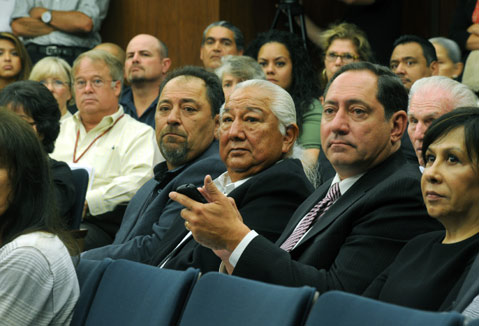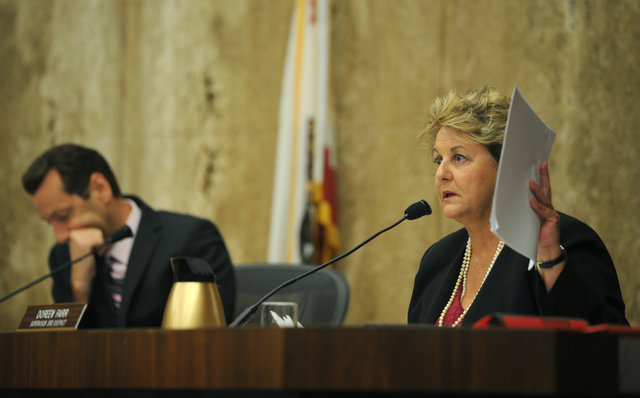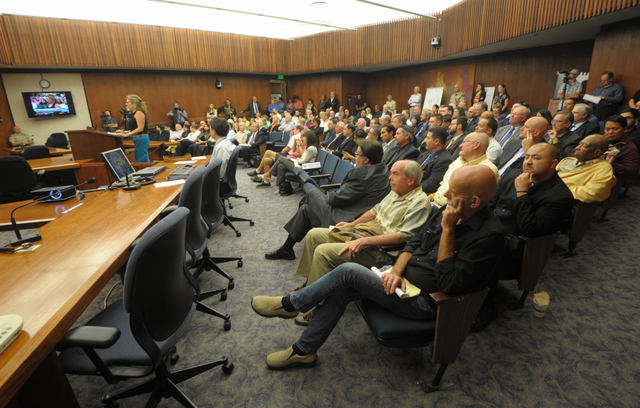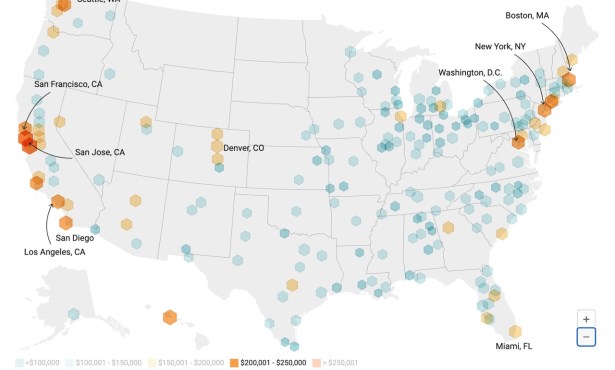County Denies Chumash Special Treatment
Supervisors Say Tribe Should Go to Planners to Develop Camp 4 Property

Fearful that any sign of cooperation may make it easier for the Chumash to expand their Santa Ynez Valley reservation — thereby taking property off the tax rolls and, more worrisome to many, out from the control of the County of Santa Barbara’s rigorous planning rules — the Board of Supervisors decided in a split 3-2 vote to deny a request to open a government-to-government dialogue with the tribe. Instead, in front of a hearing room packed mostly with critics of the tribe, the majority of supervisors directed the tribe to go through the normal planning process like any other developer.
“For me, when we talk about government-to-government, we are talking about issues specific to their sovereign status on their reservation,” said 3rd District Supervisor Doreen Farr, who represents the valley and has loudly opposed the ongoing attempt to annex the 1,400-acre Camp 4 property to the Chumash reservation. “They are private-property owners like many of us are in the valley when we are talking about ownership of properties not to do with the current reservation.”

In opposition to the vote were Supervisors Salud Carbajal and Steve Lavagnino, who both believe that a government-to-government dialogue would be appropriate. Carbajal said he believes the federal annexation process exists as a remedy to the “many, many wrongs that have occurred in our country” to Native Americans, whereas Lavagnino believes that denying the dialogue would actually backfire, explaining, “If we send a message that we don’t want to talk to the tribe, it sends a green light to Congress that they’ve exhausted all of their remedies, and the only outlet would be a legislative fix.”
Though the agenda item wasn’t specific to Camp 4, the property — which the Santa Ynez Band of Chumash Indians bought from actor-turned-vintner Fess Parker for $40 million in 2010 — loomed over the proceedings. Almost every single one of the dozens of public speakers mentioned Camp 4 while lodging concerns over everything from unchecked development and scarcity of water to whether the tribe could be trusted to do what they have pledged. Filing an application to annex the land via the fee-to-trust process earlier this year with the Bureau of Indian Affairs (BIA), the tribe — whose members historically lived in relative poverty until opening the Chumash Casino Resort in 2004 — has repeatedly said it intends to build 143 homes on Camp 4, not another resort or casino. The BIA produced an environmental report on that annexation, available at ChumashEA.com, and is accepting public comments on the proposal until September 19.

For the Chumash, Tuesday’s discussion was about more than Camp 4. “I believe that it’s time that Santa Barbara County step up to the plate, recognize the tribe as a government, and have those dialogues,” said Tribal Chairman Vincent Armenta, explaining that tribes have such relationships with jurisdictions across the country. “It would eliminate a lot of the confusion that’s going on.” Part of that confusion involves the 11,500-acre “Tribal Consolidation Area” (TCA) that the BIA approved on behalf of the Chumash as part of the ongoing application. Armenta suggested that, had the county already started the desired dialogue, the supervisors would have learned about that prior to this week.
News of the TCA shocked residents, as it encompasses a large part of the Santa Ynez Valley and is seen as an end-run around the usual hurdles for an “off-reservation” annexation, which is harder than taking over adjacent lands. The TCA designation also triggered a closed session prior to Tuesday’s hearing, with the supervisors directing staff to investigate what can be done to oppose that move, including whether litigation would be appropriate. Chumash critics were also dismayed to learn that the tribe had lobbyists in Sacramento last week, trying to obtain signatures in support of the Camp 4 annexation.
Longtime environmental activist Susan Jordan, who is taking a stand against the Camp 4 annexation because she fears it is an unparalleled proposal, was “thrilled” by the decision. “This is not about not talking — this is about having the right conversation between the right entities,” said Jordan. “What happens here will set a precedent statewide. That can’t be ignored anymore.”
The Chumash, however, were dismayed that their more than two-year-old attempt to open equal discussions with the county was denied. “Unless we have some sort of cooperative or intergovernmental agreement, the process moves forward without any participation by the county,” said the tribe’s government affairs liaison Sam Cohen after the decision. “They opted out of the process.”


